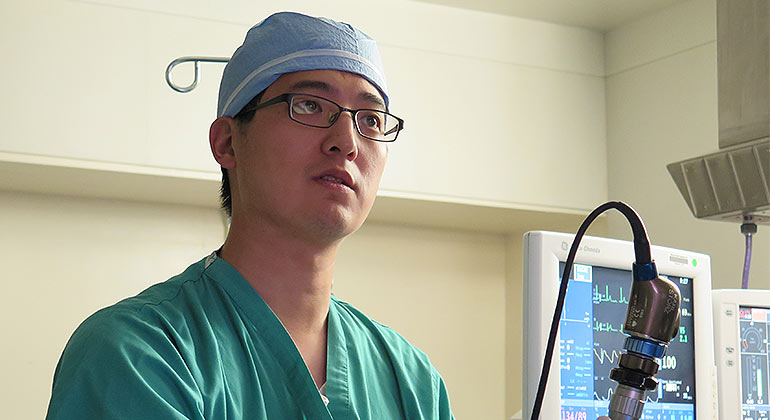About the Sleep Surgery Program at Mount Sinai

The Division of Sleep Surgery specializes in the comprehensive management of obstructive sleep apnea (OSA) and sleep-disordered breathing. Led by Division Chief Dr. Fred Lin, the team at the Mount Sinai Health System is comprised of otolaryngologists (ear, nose and throat doctors) who are either board certified in sleep medicine or fellowship trained in sleep surgery. Our Sleep Surgery Program offers patients the full spectrum of nonsurgical and surgical treatments for OSA, including the Inspire Therapy implant device for those who cannot comply with the CPAP regimen. Additionally, we work in a multidisciplinary approach, collaborating closely with experts in the Division of Pulmonary and Sleep Medicine, the Division of Oral and Maxillofacial Surgery, the Department of Neurology, and the Metabolic and Bariatric Surgery Program to provide patients with the collective expertise for all facets of their care.
About Obstructive Sleep Apnea and Personalized Plans
In its simplest form, OSA is a disorder in which breathing is repeatedly interrupted or decreased during sleep. This is generally secondary to muscle relaxation in the throat and tongue, which close the airway, preventing airflow and causing oxygen starvation. When this occurs, the brain sends a survival signal to awaken to a lighter level of sleep and breathing is restored.
This process can be repeated up to hundreds of times each night. The combination of poor sleep and oxygen starvation may cause daytime sleepiness, deficits in memory, attention, concentration, and depressed mood. Untreated sleep apnea may also increase the risk of medical conditions, such as high blood pressure, cardiac arrhythmias, and stroke.
The sleep surgery team at Mount Sinai West and The Mount Sinai Hospital (hospitals at the Mount Sinai Health System) provides patients with a customized plan to best accommodate their lifestyle and severity of sleeping disorder. First, patients are diagnosed via a sleep study, formally known as a polysomnography, and sleep disorder breathing evaluation. An office-based flexible fiberoptic airway evaluation and/or a neurologic evaluation may also be required. The cause of airway obstruction varies among patients, and the treatment plan depends on the areas affected by the interrupted airflow.
Expertise in the Full Range of Obstructive Sleep Apnea Surgeries
The sleep surgery expert at Mount Sinai offer patients the full range of OSA treatment. Snoring without the presence of sleep apnea may be treated with oral appliances and in-office radiofrequency techniques. However, patients diagnosed with sleep apnea may be recommended for surgery. Our sleep surgeons have vast expertise in the following surgical treatments:
Palate Procedures:
- Uvulopalatopharyngoplasty (UPPP)
- Uvulopalatal flap
- Expansion sphincteroplasty
- Palatal Advancement
- Tonsillectomy for obstructive sleep apnea
Nasal/Airway Surgeries:
- Nasal surgery for sleep apnea
- Septoplasty
- Turbinate reduction
- Nasal valve collapse
Jaw Surgeries:
Robotic surgery
Tongue advancement or ablation surgery
Our goal is to improve not only the health, but also the quality of life, of sleep apnea patients. We measure all patients pre- and post-treatment with the SNORE-25 quality of life measure, which is a validated quality of life survey. Our results have shown significant gain in improvement of sleep quality and daytime symptoms of night time sleep disturbances post-surgery.